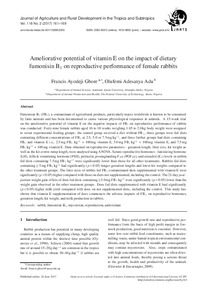| dcterms.abstract | Fumonisin B1 (FB1), a contaminant of agricultural products, particularly maize worldwide is known to be consumed by farm animals and has been documented to cause various physiological responses in animals. A 15-week trial on the ameliorative potential of vitamin E on the negative impacts of FB_1 on reproductive performance of rabbits was conducted. Forty-nine female rabbits aged 16 to 18 weeks weighing 1.65 to 2.0 kg body weight were assigned to seven experimental feeding groups: the control group received a diet without FB_1, three groups were fed diets containing different concentrations of FB_1 at 2.5, 5.0 or 7.5 mg kg^(−1), and three further groups had diets containing FB_1 and vitamin E i.e., 2.5 mg FB_1 kg^(−1) + 100 mg vitamin E, 5.0 mg FB_1 kg^(−1) + 100 mg vitamin E, and 7.5 mg FB_1 kg^(−1) + 100 mg vitamin E. Data obtained on reproductive parameters - gestation length, litter size, kit weight as well as the kit crown-rump length, were analysed using ANOVA. Serum reproductive hormones - luteinizing hormone (LH), follicle stimulating hormone (FSH), prolactin, prostaglanding F_2α (PGF_2α), and estradiol (E_2) levels in rabbits fed diets containing 7.5 mg FB_1 kg^(−1) were significantly lower than those for all other treatments. Rabbits fed diets containing >= 5 mg FB_1 kg^(−1) had significantly (p<0.05) longer gestation lengths and lower kit weights compared to the other treatment groups. The litter sizes of rabbits fed FB_1-contaminated diets supplemented with vitamin E were significantly (p<0.05) higher compared with those on diets not supplemented, including the control. The 21-day postpartum weight gain of kits of does fed diets containing >=5.0 mg FB_1 kg^(−1) were significantly (p<0.05) lower than the weight gain observed in the other treatment groups. Does fed diets supplemented with vitamin E had significantly (p<0.05) higher milk yield compared with does on not supplemented diets, including the control. This study has shown that vitamin E supplementation of does counteracts the adverse impacts of FB 1 on reproductive hormones, gestation length, kit weight, and milk production in rabbits. | eng |

